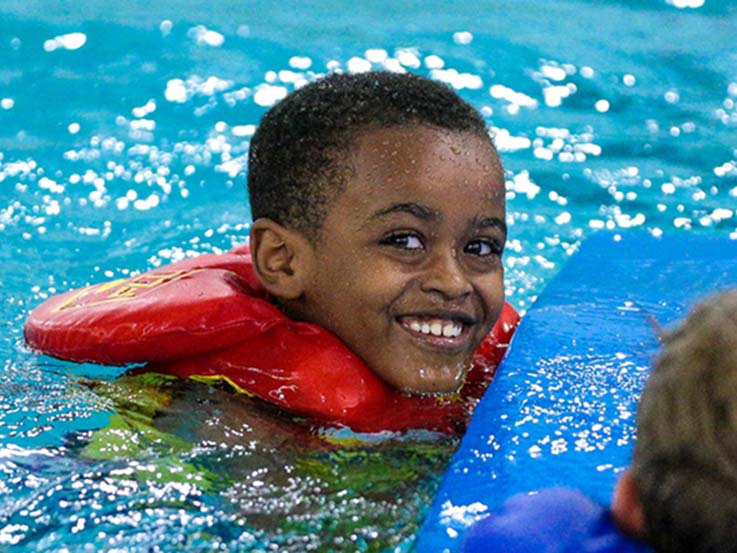Health & Safety

As an accredited member of the Ontario Camps Association, Toronto Met Day Camp adheres to all OCA safety & operational standards. This includes following guidance related to COVID-19 from our local, provincial, and national public health agencies.
All Toronto Met Day Camp staff are certified in Standard First Aid & CPR-C. Instructional staff have experience in a variety of day camp program areas. Aquatic staff have additional lifeguarding certification. Each staff member is required to successfully complete a criminal background check.
In the event of a non-emergency medical need, we are supported by TMU's Campus Safety & Security team, who have advanced certification in First Aid.
Each family is required to provide up-to-date health information as part of the camper application process. This allows staff to prepare for your camper’s arrival in advance of Camp.
Health and safety at Toronto Metropolitan University is governed by the university’s Department of Integrated Risk Management.
We are an official SUN AWARE Certified Camp Program (external link) . The SUN AWARE program was created by the Melanoma Network of Canada.
As a SUN AWARE certified camp, we follow a program designed to promote sun safety with all campers and staff members. Our staff team receives training on sun safety prior to the Summer.
We are aware of the dangers of over-exposure to the sun and strive to take reasonable precautions to prevent adverse effects of the sun and UV rays. Campers spend time outside each day, so please help us by packing a hat with a brim and sunglasses, and sending sunscreen for your child (minimum SPF 30, though higher is preferable), and a water bottle with your child’s name on it.
We strongly suggest that campers wear light clothing that covers shoulders and arms when they are outside.
We are sensitive that some of our campers are allergic to nuts, and that some of those allergies are potentially fatal.
To ensure a safe camp environment for those campers with nut allergies, we ask that families not send their camper to Toronto Met Day Camps with any food that may:
- Contain nuts, peanuts, or tree nuts
- May contain traces of nuts, peanuts, or tree nuts
- May have come in contact with nuts, peanuts, or tree nuts (i.e., being made on a surface or with a utensil that was also used to prepare foods with nut products or residue)
If your child has any allergy, please contact the Camps Coordinator (camps@torontomu.ca) to discuss the allergy and any accommodations that may need to be made.
* While we do our best to maintain a safe environment for campers with nut allergies, it is important that parents and campers remember that Toronto Metropolitan University is a public facility. We cannot control all foods that are brought onto campus, and there is always a risk that a child may be exposed to nuts or nut products. If this is a concern, please contact the Camps Coordinator.
Head Lice
Head lice are quite common in school-aged children. Lice are acquired by close head-to-head contact with someone who already has head lice. Head lice can also be spread indirectly by contact with someone’s personal belongings (i.e. clothing, hats, head gear, hair accessories). Contact can be common, even by accident at school, home, or at camp.
Please help us prevent the spread of head lice by checking your child thoroughly for head lice/nits three days before their first day at camp.
The head louse is an insect that lives and breeds on your head. The louse may be brown or grayish, with a flat, wingless body 1-2 mm in length with six legs. The eggs may be yellow, brown, or white teardrop-shaped. They are glued to the hair near the scalp and are called “nits”. It is usually the eggs which are first noticed.
Children with lice must be kept at home until treatment has been completed and the child is free of all head lice and nits. If your child is found to have head lice while at camp, we will phone a parent to pick them up immediately.
If your child requires medication while at camp, that medication is to be kept in the Camp Office. When you drop your camper off in the morning, please make sure that you give your child’s medication to a staff member. Likewise, please pick up the medication from a staff member at the end of the day.
Our Administration & Wellness Lead helps administer medication at the appropriate time. We ask that caregivers sign an authorization form giving us permission to dispense medications. Please ask us for this form if your child will require medications during the camp day. A few notes about medications:
- Medication must be in its original container
- That container must indicate:
- Your child’s name
- The name of the medication
- The dosage of medication
- The frequency with which the medication is to be administered
- The route of administration (i.e. taken orally)
If your child uses an epipen or asthma inhaler they may, of course, keep that medication with them while they are at Camp. We recommend that you send two epipens and/or two inhalers with your child if they may require either. Please provide your child with a waist pack that they can wear to keep their epipen or inhaler close by.
As always, the safety of our campers and staff is our top priority.
In response to COVID-19, all our in-person programs follow the guidelines published by the Ministry of Health for the safe operation of day camp programs. For more information about how these guidelines shape our programs, visit our COVID-19 page.